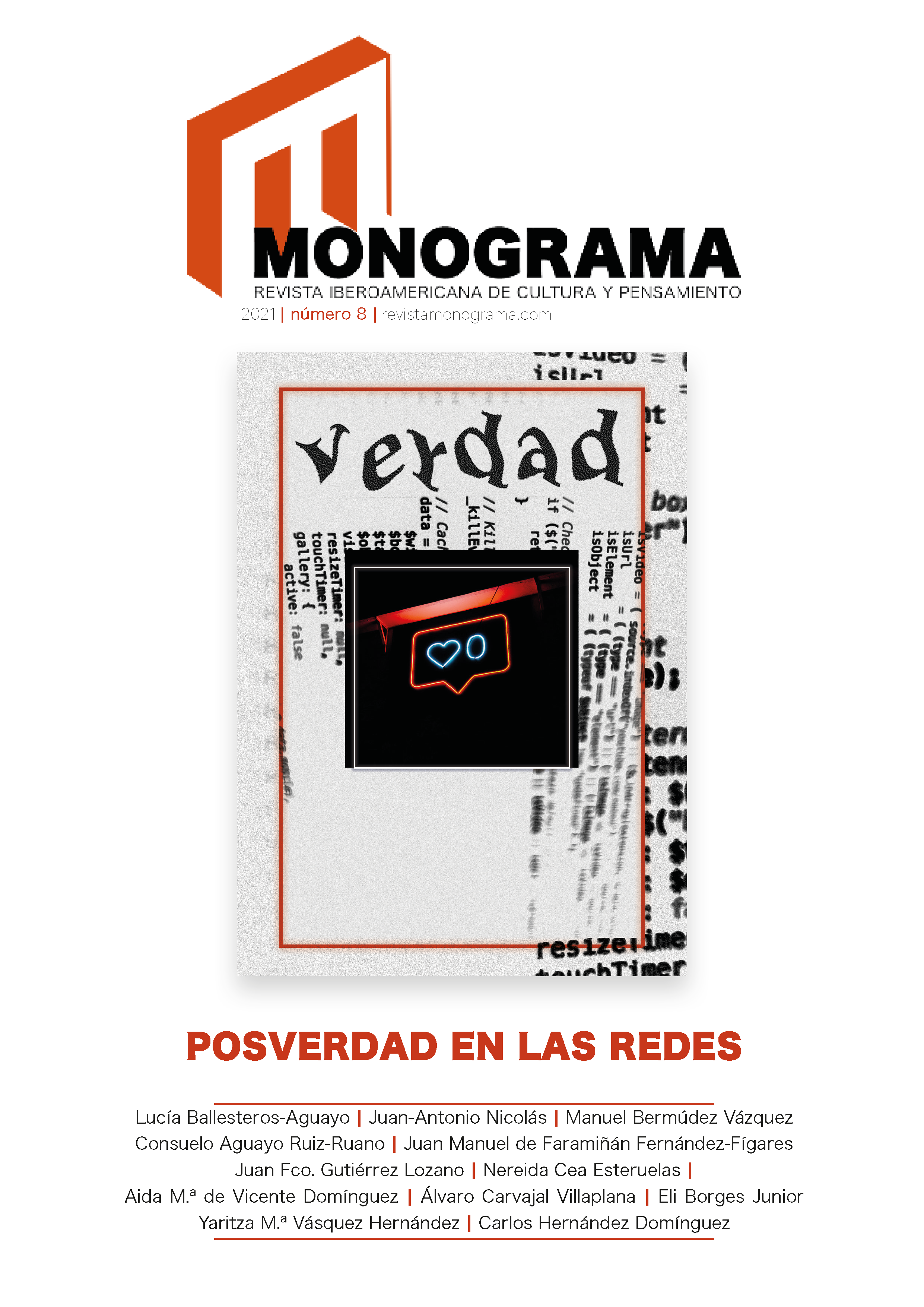Post-truth in the Age of the Digital Panopticon
DOI:
https://doi.org/10.36008/monograma.2021.08.1955Keywords:
post-truth, digital panopticon, psychopolitics, neoliberalism, big dataAbstract
We are living in a world where the fictional character has been introduced in our lives. Fantasy and reality converge in the same framework: the fake news. Post-truth in these kinds of notices do echo through the social media used like psychopolitics methods. Neoliberalism uses these tools thanks to big data with the objective of fragmenting the information and, also, the truth. Our postmodern condition has been one of the elements, also the development of computing science, that gives rise to this situation in which truth is not important. We move to search affects, reactions, likes; in the information era the most important is the emotion, rationality is not.
Downloads
References
AZNAR, F. (2018). «El mundo de la posverdad». Cuadernos de estrategia, 197, pp. 21-82.
BAUMAN, Z. (2015) Modernidad líquida. México D. F.: Fondo de Cultura Económica.
BOBBIO, N., MATTEUCCI, N. y PASQUINO, G. (1998). Diccionario de política. México D. F.: Siglo XXI.
FRANKFURT, H. (2006). On Bullshit! Sobre la manipulación de la verdad. Barcelona: Paidós.
GUTIÉRREZ-RUBÍ, A. (2020). «Tecnopolítica y los algoritmos». En Sabariego, J., Jobim, A. y Baldasierra, E. (orgs.). Algoritmos. São Paulo y Valencia: Tirant lo Blanch, pp. 102-112.
HAN, B.-C. (2014). Psicopolítica. Barcelona: Herder.
HERNÁNDEZ, C. (2021). «Big Data, Comunicación y Consumo: Del panoptismo benthamiano al panoptismo digital». En Elías, R. y Jiménez, G. (coords.). Reflexiones en torno a la comunicación organizacional, la publicidad y el audiovisual desde una perspectiva multidisciplinar. Madrid: Fragua, pp. 63-78.
KEYES, R. (2004). The post truth era. Nueva York: St. Martin’s Press.
LOMELÍ, J. (2019). «Posverdad y psicopolítica». Análisis, 51(95), pp. 347-364. doi: https://doi.org/10.15332/21459169.4475.
LYOTARD, J.-F. (1987). La condición posmoderna. Buenos Aires: Cátedra.
MENÉNDEZ, J.-M. (2021). «Posverdad: Una cuestión de fe». En Mancinas, R. y Cárdenas, M.-L. (coords.). Medio y comunicación en tiempos de posverdad. Madrid: Fragua, pp. 310-314.
PALACIO, F. y CAPOVILLA, C. (2021). «Posverdad: Etapa suprema de la postmodernidad». En Mancinas, R. y Cárdenas, M.-L. (coords.).Medio y comunicación en tiempos de posverdad. Madrid: Fragua, pp. 183-203.
POST-TRUTH (2016). Oxford Learner’s Dictionaries. Disponible en: https://www.oxfordlearnersdictionaries.com/definition/english/post-truth?q=Post-truth.
QUINTANA, P. (2007). «On Bullshit! Sobre la manipulación de la verdad». Discusiones filosóficas, 8 (11), pp. 316-329.
RAMOS CHÁVEZ, A. (2018). «Información líquida en la era de la posverdad». Revista General De Información y Documentación, 28(1), 283-298. doi: https://doi.org/10.5209/RGID.60809.
RUIZ, J. C. (2019). «Posverdad, esceptiscismo y pensamiento crítico: el ciclo de la vida pública». En Ballesteros, L. y Bermúdez, M. (eds.). La posverdad a debate. Madrid: Egregius, pp. 13-26.
ZAFRA, R. (2020). «Redes y Posverdad». En Sabariego, J., Jobim, A. y Baldasierra, E. (orgs.). Algoritmos. São Paulo y Valencia: Tirant lo Blanch, pp. 69-82.
Downloads
Published
How to Cite
Issue
Section
License
Copyright (c) 2021 Monograma. Revista Iberoamericana de Cultura y Pensamiento

This work is licensed under a Creative Commons Attribution-NonCommercial-NoDerivatives 4.0 International License.
Esta obra está bajo una licencia de Creative Commons Reconocimiento-NoComercial-SinObraDerivada 4.0 Internacional






